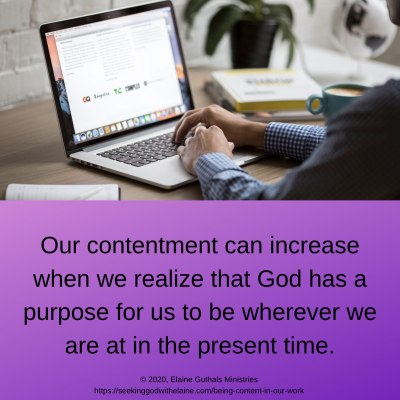We spend a significant portion of our day focused on our work. If we are not content there, it affects other portions of our lives. This daily devotional looks at how we are to approach our contentment at work and how joy and contentment are interconnected.
Nuggets
- We have to look at our employment as it — whatever we are doing — is ordained by God.
- God wants us to be working toward what He wants us to be working toward.
- Joy is overarching contentment.
Devotions in the Contentment Leads to Tranquility series
Being Content in Our Work

We look at our jobs as being totally secular (unless we work in a religious capacity). How can God expect us to find contentment in the world?
Let's Put It into Context
The Holman Bible Dictionary defines contentment as “an internal satisfaction which does not demand changes in external circumstances.”
Resource
Why Do We Work?
“The sleep of a laborer is sweet, whether they eat little or much, but as for the rich, their abundance permits them no sleep” (Ecc. 5: 12 NIV)
Our employment usually does take a significant amount of time and effort. Normal used to be considered 9 to 5. That is when the majority of the business world functions, but that has never been the only time people work.
There are many jobs that must be covered 24/7 — even 365. Police and medical professions come quickly to mind.
Some positions are no longer the three-shift variety. Some take 12-hour shifts, like medical professionals and firemen.
Hopefully, we don’t just work for the money. Oh, yes. We should be responsible for providing for ourselves and our families.
It helps to like the work. (I know, understatement there.) We have to want to go to work every day.
Liking our co-workers is also helpful. We spend the majority of our time with them, so getting along helps increase our contentment.
But I keep thinking back to a devotion we just had. In Spiritual Wisdom Leads to Righteousness, we said that God doesn’t ignore us. Horton wrote, “It is a part of the Lord’s watchful activity and direct connection with all the affairs of human life that He is interested in our business and trade.”
Resource
We have to look at our employment as it — whatever we are doing — is ordained by God. “A person’s heart plans his way, but the Lord determines his steps” (Prov. 16: 9 CSB). God has us where we will benefit His kingdom the most.
To read a related devotion, click the button below.
Our jobs are also our mission field. It is where we are to “go, therefore, and make disciples of all nations, baptizing them in the name of the Father and of the Son and of the Holy Spirit, teaching them to observe everything I have commanded you …” (Mt. 28: 19-29 CSB).
Jesus told us we have to start where we are. “But you will receive power when the Holy Spirit has come upon you, and you will be my witnesses in Jerusalem and in all Judea and Samaria, and to the end of the earth” (Ac. 1: 8 ESV).
Our contentment can increase when we realize that God has a purpose for us to be wherever we are at in the present time. I am firmly convinced that God has at least one person that we must witness to in our lives. We’ve got to be there for that Tom or that Sally. If we aren’t, how are they going to hear?

Are We to be Goal-Oriented?
“All of a person’s labor is for his stomach, yet the appetite is never satisfied. What advantage then does the wise person have over the fool? What advantage is there for the poor person who knows how to conduct himself before others? Better what the eyes see than wandering desire. This too is futile and a pursuit of the wind” (Ecc. 6: 7-9 CSB)
Hmmm. Solomon has an interesting way of wordsmithing, doesn’t he?!
Let’s look at it in the Contemporary English Version. “We struggle just to have enough to eat, but we are never satisfied” (Ecc. 6: 7 CEV).
Oh, isn’t that the truth?
It seems like Solomon is telling disciples of Christ not to be goal-oriented people. But wouldn’t that make us not purpose-driven people, as God has called us to be?
I can see how we could be able to justify the never-being-satisfied part. I am a big goal-oriented person. I need to have milestones to work toward. It helps keep me focused on doing something because I know what I am supposed to be doing.
Hopefully, we reach our goals. (If we don’t, we will get real discouraged really fast!)
But then that means we have to set new goals, right? We always have to keep working toward something.
I can see how that looks like we aren’t satisfied. Right after I got my bachelor’s degree, my goal switched to getting my master’s degree. Right after I got my master’s degree, my goal switched to get my PhD.
However, that was just breaking the final goal up into manageable sections. Sometimes, if we just have the overall goal right before us, we get overwhelmed and burned out.
I think that God wants us to be working toward what He wants us to be working toward. Otherwise, Solomon wouldn’t have said, “Better what the eyes see than wandering desire. This too is futile and a pursuit of the wind” (Ecc. 6: 9 CSB).
Without goals, we could be pursuing the wind. And we know all about the wind. “The wind blows where it pleases, and you hear its sound, but you don’t know where it comes from or where it is going” (Jn. 3: 8 CSB).
We don’t want to be the tumbleweed. It is dried up and aimless.
We want to be productive workers doing God’s work. God uses plans for that. “For I know the plans I have for you,” declares the LORD, “plans to prosper you and not to harm you, plans to give you hope and a future” (Jer. 29: 11 NIV).

Contentment and Joy
“And I commend joy, for man has nothing better under the sun but to eat and drink and be joyful, for this will go with him in his toil through the days of his life that God has given him under the sun” (Ecc. 8: 15 ESV)
Okay, switching to talk about joy may seem a little out of place because when we have been talking about contentment. But let’s think about it a second. Contentment is an internal satisfaction regardless of external circumstances.
Joy, on the other hand, is “the happy state that results from knowing and serving God.”
Resource
Joy is overarching contentment. It all comes from God.
We may scratch our heads a little over the eat, drink, and be merry part. I see this verse as saying what God sees. We usually equate that with the indulgence part — the sinful part.
Statham put it into perspective. He wrote, “God makes no distinction either of meats or drinks, provided we use all lawfully, to the just refreshment and strengthening of the body, not to its undue pampering, or mere carnal gratification.”
Resource
It is back to moderation again. God doesn’t want us to go to extremes — either way.
God knows we are going to work hard, sometimes long hours. That was part of the curse. “You will eat from it by means of painful labor all the days of your life. It will produce thorns and thistles for you, and you will eat the plants of the field. You will eat bread by the sweat of your brow until you return to the ground …” ( Gen. 3: 17-19 CSB).
Because God knows we are going to put in long, hard hours, He made us a day of rest. “So the heavens and the earth and everything in them were completed. On the seventh day God had completed his work that he had done, and he rested on the seventh day from all his work that he had done. God blessed the seventh day and declared it holy, for on it he rested from all his work of creation” (Gen. 2: 1-3 CSB).
That tells me God doesn’t want us to work 24/7/365. He want us to enjoy our lives. If the fruits of the Spirit are “…love, joy, peace, longsuffering, kindness, goodness, faithfulness, gentleness, self-control…” (Gal. 5: 22-23 NKJV), how can we not enjoy our lives?
To read a related devotion, click on the appropriate button below.
Statham noted that we are to “cultivate a cheerful and a happy frame of mind, as opposed to that gloomy, over-anxious, ever-toiling disposition, which you now possess — as is the cold, cheerless mantle of night to the glow and warmth of the midday sun — for this calm and tranquil state shall abide with you, and give you enjoyment in the midst of your labour all the days of your life which God giveth you under the sun.”
Resource
Statham connected this to several verses.
• “Therefore I tell you: Don’t worry about your life, what you will eat or what you will drink; or about your body, what you will wear. Isn’t life more than food and the body more than clothing?” (Mt. 6: 25 CSB).
• “But seek first the kingdom of God and his righteousness, and all these things will be provided for you” (Mt. 6: 33 CSB).
• “So, whether you eat or drink, or whatever you do, do all to the glory of God” (I Cor. 10: 31 ESV).
• “Rejoice in the Lord always; again I will say, rejoice” (Phil. 4: 4 ESV)
We have to look to God for our contentment and joy.

Making the Connections
I think the thing I got out of this study was that God doesn’t want us to go to extremes. His term for it was sober. Sober is a character trait distinguished by self-control, genuineness, and sound moral judgment. It is a calm and temperate disposition.
Making the Connections to Self-Discipline
One of the aspects of sober is self-control. Self-control is the ability to withstand temptations by managing ourselves — our emotions, thoughts, and behaviors.
We have to use self-discipline to do self-control. Self-discipline is where we manage ourselves so that we can improve.
How Do We Apply This?
How do we become more content? We have to put our faith and trust in God. We have to know and believe that He will provide for us what we need.
No, it may not necessarily be all we want. It will be all we need.
So, the question becomes how do we grow our faith and trust in God. We have to seek Him.
Searching for and Seeking God
Hearing His Word (Rom. 10: 17).
Reading His Word (Rev. 1: 3).
Praying to Him (Heb. 4: 16).
Studying His Word (Ac. 17: 11).
Meditating on His Word (Ps. 1: 1-2).
Memorizing His Word (Ps. 119: 11).
We have to put our lives in God’s hands. He is all-knowing and all-powerful. We have to rely on Him.
Loving Heavenly Father. We are humbled that You are mindful of us. Lord, we want to improve. We want to be more like You. The only way was can do that is to discipline ourselves so that we can control our sinful nature when temptations come our way. We can’t discipline ourselves without You. Help us to grow in grace and knowledge of You. Amen.
What do you think?
Leave me a comment below (about this or anything else) or head over to my Facebook group for some interactive discussion.
If you don’t understand something and would like further clarification, please contact me.
If you have not signed up for the email daily or weekly providing the link to the devotions and the newsletter, do so below.
If God has used this devotion to speak with you, consider sharing it on social media.
Pingback: How Does Sober Mindedness Promote a Balanced Life? – Seeking God with Elaine
Pingback: Godliness: The Parent of Contentment – Seeking God with Elaine
Pingback: Final Thoughts on Setting Our Affections on Things Above – Seeking God with Elaine
Pingback: Joy in Knowing Jesus – Seeking God with Elaine
Pingback: Joy and Contentment – Seeking God with Elaine